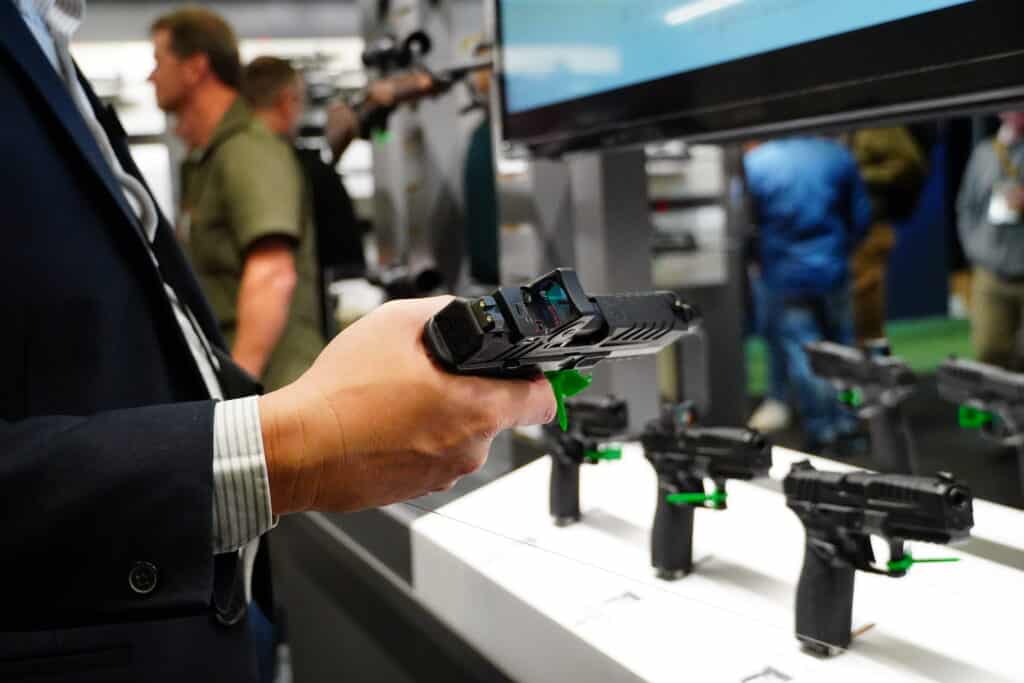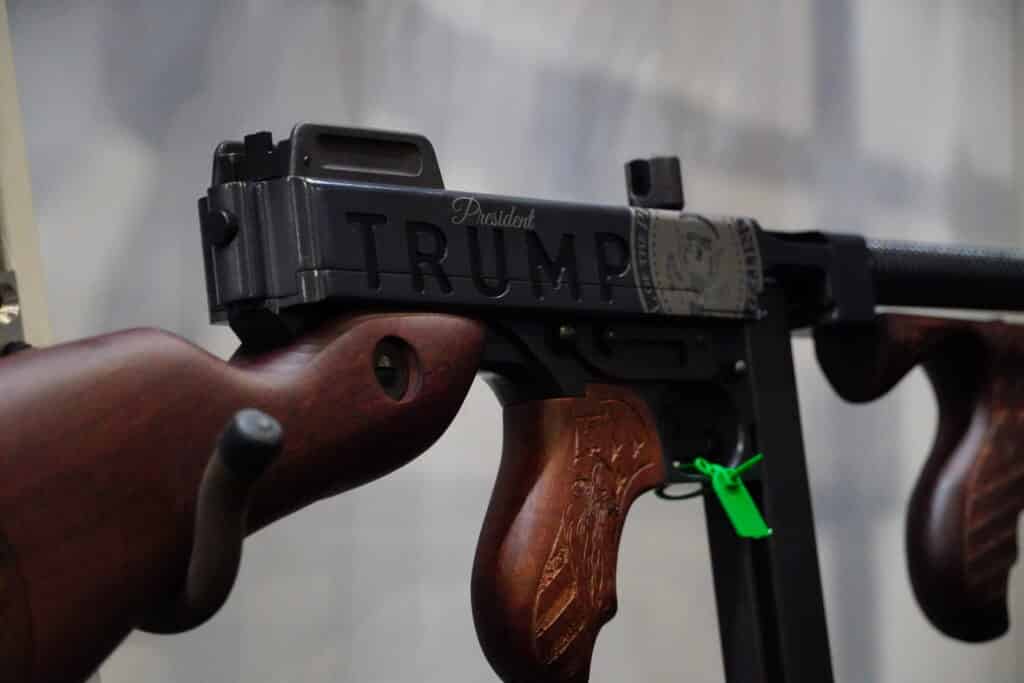This week, we made it into the new year.
2025 is sure to be an eventful year for gun policy. So, Contributing Writer Jake Fogleman is taking a look ahead at what are likely to be the biggest storylines of the year.
One of those storylines concerns the ATF. The agency just confirmed that Director Steven Dettelbach will step down shortly before Donald Trump retakes office. That gives him an opportunity to try and appoint his own permanent director, but I lay out why that’s probably going to be a tall task.
Plus, the head of Let’s Talk to Them joins the podcast to explain how the non-profit is trying to dissuade mass shooters.

Analysis: A Look Ahead to 2025 on Guns [Member Exclusive]
By Jake Fogleman
When it came to gun politics, 2024 came and went with more of a whimper than a bang.
Yet a relatively quiet 2024 does not necessarily presage the same for 2025. November’s election results and the ongoing torrent of Second Amendment lawsuits working their way through the federal court system offer plenty of potential for landscape-shifting changes to gun politics and policy.
Here’s a look at some of the major gun-related storylines to follow in the new year.
Donald Trump, GOP Retake Control
All eyes will be on President-elect Trump and what his administration plans to do on gun policy once they return to power later this month.
On one hand, Trump heads to office as a convicted felon who can no longer legally possess firearms, and his campaign this time around downplayed guns as a campaign issue. The GOP even stripped most of its gun policy promises from its 2024 platform.
At the same time, Trump did make some specific promises to gun owners. He pledged to undo “every single Biden attack on gun owners and manufacturers” at an NRA event in early 2024. Gun-rights advocates will be pushing to see that Trump makes good on those promises.
This week, one of those promises fulfilled itself. Trump has repeatedly said he intended to fire President Biden’s ATF Director, Steve Dettelbach. This week, the ATF confirmed to The Reload that Dettelbach plans to voluntarily step down from the post two days before Trump retakes office.
That sets up an early test of Trump’s intentions. He has yet to announce an ATF nominee. He will have to decide whether to nominate his own permanent ATF Director candidate and take on the tough battle of getting them confirmed or he could simply rely on acting directors, as he did after his first shot at a permanent director went astray in 2019.
Beyond the agency’s leadership, Trump will also have to decide how much effort to put into changing the ATF’s enforcement priorities and regulatory interpretations. The most consequential of Biden’s gun policy shifts was the ATF’s zero-tolerance enforcement approach to gun dealers and its issuance of several new rules restricting so-called ghost gun kits, pistol braces, and used gun sales. In 2025, Trump could engineer an about-face in the agency’s posture toward gun dealers and initiate rulemaking to rescind most of Biden’s regulations.
How the former President plans to follow through on his repeated pledges to exact retribution on his perceived enemies could impact gun policy as well. Those threats have already prompted a rash of gun buying among anxious left-leaning gun owners. However, Trump has not specifically threatened the gun rights of his political opponents or any other specific group.
Finally, how Trump and his fellow Republicans shepherd early bills through a narrowly divided Congress will indicate whether new gun laws are possible. National concealed carry reciprocity, suppressor deregulation, and other gun-rights movement legislative priorities all hinge on the ability and political will of an especially fractious GOP congressional caucus with little margin for error.
It could also shed light on how difficult any Supreme Court appointment could be if Trump gets the opportunity to make more picks during his second term. Although, the margin for error will be significantly larger in that case since he’ll only need to get a candidate through the Senate and only by a majority vote.
Supreme Court
Speaking of the Court, it is primed to once again make lasting changes to gun policy.
For instance, the Court is guaranteed to issue a new gun-related ruling in Garland v. VanDerStok. That forthcoming opinion will decide the fate of the Biden Administration’s bid to crack down on homemade firearms kits, which not only has implications for the regulatory fate of one of the most hot-button facets of gun politics in recent years but could also impact how successful Trump is in repealing the rest of Biden’s firearm regulations once he’s in charge of the ATF. After all, the case’s oral arguments suggested a Court majority leaning toward upholding the regulation as a correct reading of the Gun Control Act.
In March, the Court will also hear oral arguments in Mexico’s suit against the US firearms industry’s biggest players. The Court will decide whether Mexico can continue to sue the gun manufacturers and dealers over cartel violence. It will be the first time that the Court has opined on the Protection of Lawful Commerce in Arms Act.
Aside from the cases it has already granted, the most closely watched Court activity in the new year will be whether it decides to take up a new Second Amendment case. The justices have shown themselves to be fickle creatures with pending Second Amendment cases over the last year, much to the chagrin of gun-rights activists.
However, two major fields of Second Amendment law appear primed for a High Court showdown in the coming months.
The case against Maryland’s “assault weapon” ban, Snope v. Brown, represents the best legal vehicle gun-rights advocates have had to date for enticing the Supreme Court to strike down AR-15 bans. It will be distributed for consideration by the justices in the coming days. Meanwhile, the proper Second Amendment approach to the most commonly prosecuted federal gun law, the gun ban for convicted felons, continues to divide federal appeals courts across the country in an increasingly untenable fashion. The Court has several pending challenges to the felon-in-possession ban it could choose from, if it wants to address the lower court dispute in the new year.
Mass Shootings and Crime Trends
The dark-horse candidate for the trend that could have the biggest impact on how salient guns will be in 2025 is the decline in mass shootings and violent crime.
Following a historic pandemic-era spike in murder and other violent crimes, 2024 saw an even more historic decline in murder and a sizeable decrease in violent crime overall. The year also saw a sizable drop in mass shootings.
According to The Violence Project—which tracks incidents in which four or more people are shot and killed, excluding the shooter, in a public location, with no connection to underlying criminal activity, such as gangs or drugs—there were only three mass shootings in 2024. That was the fewest since 2020 and the second-lowest annual total the group has tracked since 2002. Even the Gun Violence Archive, which uses a much broader definition that counts any incident in which four or more people are shot, recorded a 24 percent drop in mass shootings in 2024.
These trends are significant because violent crime, and mass shootings in particular, tend to have an outsized impact on the public consciousness. Higher violent crime rates and frequent mass shootings tend to correlate with increased public support for gun control, which then tends to recede as the violence recedes.
If murders and mass shootings continue to decrease, that could further reduce pressure to institute new gun restrictions in 2025.
Gun Sales
Finally, firearms sales trends will be worth keeping an eye on in the new year.
The industry is coming off of a year that saw fewer gun sales than in 2023 despite a presidential election with a stark contrast on gun policy between the two major candidates. In 2025, it will be forced to confront Trump’s return to the White House. While Trump is very likely to implement gun policies the industry prefers, he could actually be worse for their bottom line–at least in the short term. His first administration infamously and unintentionally brought about the “Trump slump.” His first three years in office were marked by declining gun sales, likely because Americans felt more secure in their gun rights and less likely to buy based on concerns over potential new bans.
His last year in office set all kinds of gun sales records. However, that year was 2020 and those sales were driven in large part by a once-in-a-hundred years pandemic and widespread rioting.
Following a post-pandemic honeymoon period of elevated sales figures and optimism surrounding a wave of new gun owners, a second Trump slump has the potential to return the industry to levels not seen in years.
However, if the economy improves–or even just perceptions of the economy–that could boost demand for guns. While most owners likely view their first gun purchase as more of a necessity than a luxury, they are more likely to put off further gun purchases during tough times. If gun buyers start to feel like they have more disposable income, some of that cash could end up at the gun shop.
It’s too early to tell how any of this will turn out now, but we’ll be here reporting on all of it as 2025 unfolds.
Podcast: The Charity Hoping to Talk Down Mass Shooters [Member Early Access]
By Stephen Gutowski
This week, we’re talking to the director of a promising new program designed to prevent acts of mass violence.
Jordan Estrada is the founder and director of Let’s Talk to Them. His group takes the latest research on mass shooters, much of which we’ve talked about on the show before, and tries to put its lessons into practice. The innovative project, which just received its IRS non-profit status, attempts to find people who are considering committing a mass shooting or other act of violence and pull them out of their downward spiral.
Estrada said he and his team consulted with numerous experts before launching their program. They concluded most mass shooters are not predetermined to commit violence. Instead, they are more like people who are experiencing suicidal ideation and can be dissuaded from going through with their attacks.
He pointed to a passage in the Buffalo shooter’s writings that indicated he had doubts about carrying out his killing spree but was egged on by visiting 4chan. Estrada said Let’s Talk to Them has built a program designed to do the opposite. He said the goal is to talk them down off the ledge, saving their lives and the lives of potential victims.
You can listen to the show on your favorite podcasting app or by clicking here. Video of the episode is available on our YouTube Channel. An auto-generated transcript is here. Reload Members get access on Sunday, as always. Everyone else can listen on Monday.

Analysis: Will Trump Get to Appoint a Permanent ATF Director? [Member Exclusive]
By Stephen Gutowski
In 2006, Congress made the ATF Director a Senate-confirmed position, and it’s been getting in the way of the president’s preferred picks ever since.
On Thursday, the ATF said Director Steven Dettelbach submitted his resignation letter to President Joe Biden. He will be out of the role precisely two days before Trump retakes the office. That gives Donald Trump another shot at appointing a permanent director of his own.
However, since it became a confirmed position, the ATF has had far more failed director nominees than confirmed ones. Can Trump overcome those odds? Will he even try?
In 2007, President George W. Bush put up the first nominee for Senate consideration. His name was Mike Sullivan, and he was already the acting director, a former Republican state representative and US Attorney. Three Republican Senators held up his nomination over concerns about how he’d enforce federal gun laws, and it never actually got a vote.
In 2009, Sullivan resigned as acting director in order to make way for President Barack Obama to appoint his own pick. That pick was Andrew L. Traver, head of the ATF’s Colorado field office at the time, and he was blocked in much the same way as Sullivan despite Democratic control of the Senate.
In 2013, Obama tried again with B. Todd Jones–another US Attorney and acting director of the ATF. This time, Obama was successful. Jones was confirmed.
However, he didn’t last long. Jones resigned in 2015 to pursue a job with the NFL.
Donald Trump was the next president to try to appoint a permanent director. He nominated Chuck Canterbury, who was President of the National Fraternal Order of Police, to fill the role in 2019. However, that candidate was once again blocked by Republicans concerned about his leanings on gun policy. He never got to vote, either.
Joe Biden took his first shot at filling the role in 2021. He picked former ATF agent turned gun-rights activist David Chipman. His nomination was sunk by Democratic Senators over a series of controversial statements backing new gun bans and reporting on accusations he’d made racist remarks while working at the ATF. Biden withdrew his nomination.
However, Biden went back to the ATF well in 2022. This time, he nominated former US Attorney and failed Ohio Attorney General candidate Steven Dettelbach. Biden picked Dettelbach as a more muted candidate, but his record of backing new gun restrictions, coupled with the polarizing nature of the confirmation process, made his confirmation a nailbiter as well.
Still, the Senate voted to confirm Dettelbach in the summer of 2022. So, it is possible to get a candidate through. It just isn’t easy and takes a lot of skill at working at least your own party as well as spending considerable political capital.
There are some reasons to think Trump could pull it off this time around. For one, he now has some experience on this front and can avoid nominating a candidate with the same issues that plagued Canterbury. He is also riding high from the best electoral performance of his career, with greater control over his own party than ever before.
Republican Senators, who will ultimately control the destiny of any Trump ATF nominee, will need good reasons to oppose anyone he puts up.
However, it’s not clear Trump is very interested in getting a permanent ATF Director confirmed. While he promised to fire Dettelbach and roll back Biden’s ATF rules during the campaign, he never promised to nominate a permanent replacement. Nor has he announced a nominee so far.
Most of the nominees he’s announced for other key law enforcement roles haven’t been met with cheers from gun-rights advocates, either. Pam Bondi, whom he picked for Attorney General, has a mixed record on guns—not dissimilar to Trump’s own record. Chad Chronister, whom he picked to head the DEA before quickly reneging, is in the same boat.
Trump was also happy to use acting directors throughout his first term, at the ATF and throughout the executive branch. He may simply opt not to get into a big political fight, likely with his own supporters, in order to get a permanent director through the often brutal Senate confirmation process. The ATF is not an agency he has spent much time talking about in public, and he may not be willing to push for a nominee if he doesn’t have to do so.
Still, even if he does decide to take another run at installing a permanent director, history shows he’ll have to navigate a difficult path to get to that endpoint.
That’s it for now.
I’ll talk to you all again soon.
Thanks,
Stephen Gutowski
Founder
The Reload







